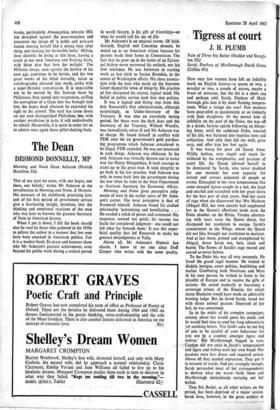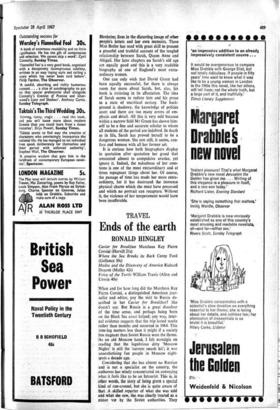Tigress at court
J. H. PLUMB
Sarah, Duchess of Marlborough David Green (Collins 45s)
How very few women have left an indelible mark on English history—a queen or two, a novelist or two, a couple of nurses, maybe a brace of actresses, but the list is a short one and perhaps only Sarah, Duchess of Marl- borough gets into it by sheer flaming tempera- ment- What a virago she was! Few mothers have quarrelled so passionately or so violently with their daughters. At the merest hint of infidelity on the part of the Duke, she was off in a tirade, furious epistle following on blister- ing letter, until the saddened Duke, wearied of his life, was battered into hopeless love and subjection. And only then did she melt, grow easy, and offer him her bed again.
It was worse for poor old Queen Anne. Mildly lesbian, very stupid and much be- wildered by the complexities and passions of court life, the Queen allowed herself to be dominated by Sarah, who never doubted for one moment her own capacity for instant and correct judgment of people or events. Entangled in her own temperament like some enraged tigress caught in a net, she leapt and snarled and scratched with her great claws for the best part of sixty years. And her roars of rage when she discovered that Mrs Masham (Abigail Hill, her own cousin) had supplanted her in the Queen's affections made even the Duke shudder on the Rhine. Tirades alternat- ing with tears wore the Queen down, but sharpened her resolution to escape. Sarah's commitment to the Whigs, whom the Queen did not like, brought her resolution to decision. And at last Anne, primed and strengthened by Abigail, threw Sarah out, lock, stock and barrel. The flames of Sarah's rage roared and soared as never before.
To the Duke this was all very unseemly. He loved the grand regal manner. He wished to disdain intrigue, court politics, backbiting and malice. Combining both Narcissus and Mars in his own person, he wished to listen to the plaudits of Europe and to receive the gifts of nations. He aimed modestly at becoming a sovereign prince of the Empire, for which status Blenheim would have made an admirable hunting lodge. But he loved Sarah; loved her with direct animal passion. Deprived of her bed, he was unmanned.
So in the midst of his complex campaigns, anxiety about her would gnaw his mind, and he would find time to send her long admonitory yet soothing letters. `For God's sake let me beg of you to be careful of your behaviour for you are krt a country amongst tigers and
wolves.' But Marlborough begged in vain. -Caution did not exist in,Sarah's temperament and tigers and wolves were her own breed. Her
passions were hot, direct and required action.
Above all they needed expression. They got it in torrents of words. And yet, strangely enough, Sarah persuaded most of her correspondents to destroy what she wrote—both Anne and Marlborough meticulously carrying out her
wishes.
Thus Iris Butler, as all other writers on the period, has been deprived of a major source. Sarah lives, however, in the great archive at Blenheim; lives in the distorting image of other people's letters and her own memoirs. These Miss Butler has used with great skill to present a graceful and truthful account of the tangled relationship between Sarah, Queen Anne and Abigail. Her later chapters on Sarah's old age are equally good and this is a very readable biography of one of England's most extra- ordinary women.
One can only wish that David Green had been equally successful, for there is always room for more about Sarah, but, alas, his book is irritating in its affectation. The idea of Sarah seems to reduce him and his prose to a state of uncritical ecstasy. The back- ground is shadowy, the knowledge of politics scant and there are too many errors of em- phasis and detail. All this is very odd because within a narrow field Mr Green has shown him- self to be a fine and accurate scholar to whom all students of the period are indebted. In death as in life, Sarah has proved herself to be a dangerous woman. She can still, it seems, con- fuse and bemuse with all her former art It is curious how both biographers display in quotation after quotation her greed that amounted almost to compulsive avarice, yet ignore it. Indeed, the nakedness of her emo- tions is one of the most extraordinary and at times repugnant things about her. Of course, the passage of time has made her more extra- ordinary, for it has destroyed the immense physical charm which she must have possessed and which no portrait can recapture. Without it, the violence of her temperament would have been insufferable.







































 Previous page
Previous page